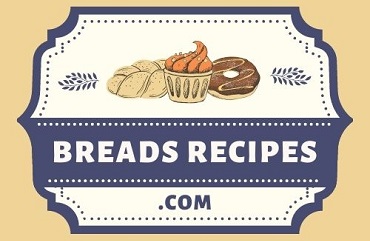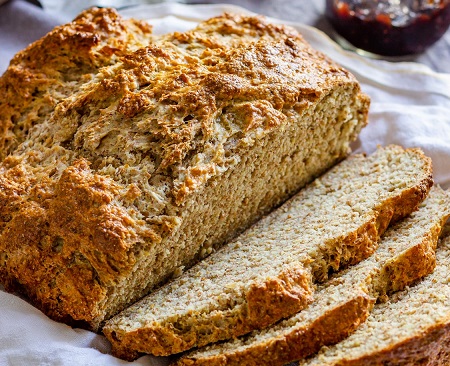Soda Breads Recipe
Hey there, bread lovers! Today, we’re diving into the wonderful world of soda bread. Now, I know what some of you might be thinking: “Soda bread? Isn’t that just a boring, dry loaf?”
Oh, my friends, let me tell you, if that’s your impression, you’re in for a delightful surprise! This humble bread has a charm all its own, and once you’ve tried a warm slice slathered with butter, you’ll wonder why it took you so long to discover its magic.
So, what exactly is soda bread? Well, it’s a type of quick bread that originated in Ireland during lean times when yeast and even ovens were luxuries many couldn’t afford.
Instead of yeast, it uses baking soda (or “bread soda” as the Irish call it) as the leavening agent. This means no waiting around for dough to rise – it’s mix, shape, and bake. Perfect for those days when you need bread ASAP, am I right?
But don’t let its simplicity fool you. Soda bread has a unique texture and flavor that’s downright addictive. It’s got a crisp crust, a tender crumb, and a subtle tang from the buttermilk that’s traditionally used.
It’s not trying to be a fluffy yeast bread or a flaky croissant. Soda bread is its own thing, and that’s what makes it special.
Now, I’ll level with you: there are about as many soda bread recipes as there are Irish grandmothers. Some add caraway seeds, others raisins or currants. Some insist it must be made with whole wheat flour, while others swear by white.
And don’t even get me started on the great “cross on top” debate! But today, we’re going to make a classic, no-frills soda bread that lets the bread’s inherent goodness shine through.
Ready to bake? Here’s what you’ll need for our soda bread recipe:
Ingredients:
- 4 cups all-purpose flour (or 2 cups all-purpose + 2 cups whole wheat for a nuttier flavor)
- 1 teaspoon baking soda
- 1 teaspoon salt
- 1¾ cups buttermilk (more or less, we’ll discuss this)
That’s it! Just four ingredients. Told you it was simple, right? Now, let’s walk through this step by step:
Preheat and Prep: First things first, get your oven heating up to 425°F (220°C). Then, grab a baking sheet and dust it with a bit of flour. No need for fancy parchment paper here – soda bread is rustic, remember?
Mix the Dry Ingredients: In a large bowl, whisk together your flour, baking soda, and salt. If you’re using whole wheat flour, make sure to mix really well. Whole wheat can be a bit heavier, so you want that baking soda evenly distributed for a good rise.
Add the Buttermilk: Now, here’s where you need to channel your inner bread whisperer. Make a well in the center of your dry mix and pour in most of the buttermilk. Using your hands (yes, get in there!), mix until the dough comes together. It should be soft but not sticky. If it’s too dry, add more buttermilk a splash at a time. Too wet? A sprinkle more flour. You’re looking for a dough that’s just cohesive, not smooth like a yeast dough.
Shape Your Loaf: Turn the dough out onto a floured surface and give it a quick knead, just 10-15 turns. We’re not trying to develop gluten here; we just want everything to come together. Now, shape it into a round about 6-7 inches across. Don’t fuss too much – rustic is the name of the game!
The Famous Cross: Using a sharp knife, score a deep cross into the top of your loaf. We’re talking about a half-inch deep here. This isn’t just for looks (though it does make your bread Instagram-worthy). Traditionally, it’s said to “let the fairies out,” but practically, it helps the bread cook evenly and gives you those gorgeous craggy bits to pick at.
Bake to Glory: Pop your loaf onto the prepared baking sheet and into the hot oven it goes. Bake for about 35-45 minutes. You’ll know it’s done when the crust is deeply golden, and the bread sounds hollow when you tap the bottom. It’s like the bread is applauding your efforts!
The Cooldown (The Hardest Part): Now, resist the urge to tear into it immediately. I know, I know, the aroma is intoxicating. But let it cool on a wire rack for at least 15-20 minutes. This lets the crumb set, so you don’t end up with a gummy texture.
And there you have it, my friends! You’ve just baked a loaf of honest-to-goodness Irish soda bread. Take a moment to admire your handiwork – that golden crust, the rustic shape. You’re not just a baker; you’re a keeper of traditions, a creator of simple joys.
Now, let’s talk about how to enjoy this beauty. First off, please, for the love of all that’s delicious, slather a warm slice with good butter. Watch it melt into all those nooks and crannies. Add a sprinkle of flaky sea salt if you’re feeling fancy. Close your eyes, take a bite, and just like that, you’re transported to a cozy Irish kitchen.
But the joy of soda bread doesn’t stop at butter. It’s a fantastic base for all sorts of toppings. Try it toasted with a smear of raspberry jam for breakfast. Or go savory with smoked salmon and a dollop of crème fraîche – hello, fancy brunch! It also makes killer sandwiches. Think thick slices piled high with sharp cheddar, crisp apples, and a bit of grainy mustard. That’s a lunch that’ll make your co-workers jealous.
And don’t even get me started on how perfect soda bread is with soups and stews. That sturdy texture is ideal for sopping up every last drop of your beef stew or tomato soup. It’s like they were made for each other. In fact, in many Irish homes, soda bread and a pot of soup or chowder is a complete meal. Simple, satisfying, and utterly delicious.
Now, what if things don’t go exactly as planned? Maybe your loaf didn’t rise as much as you’d hoped, or it’s a tad on the dense side. Don’t worry! Soda bread is forgiving. If it’s too dense, you might have used too much flour or not enough baking soda. Remember, measurements in baking are more of a guideline – you need to feel the dough. And if your bread is a bit flat, make sure your baking soda is fresh. Unlike that ancient spice jar in the back of your cupboard, baking soda does have a shelf life.
Let’s geek out for a moment on the science of soda bread. The magic happens when the acidic buttermilk meets the alkaline baking soda. This dynamic duo creates carbon dioxide bubbles, which make your bread rise. It’s like a mini science experiment in your bowl! This reaction happens fast, which is why you don’t want to overwork the dough. The more you knead, the tougher it gets, and you’ll end up with a doorstop instead of dinner.
And can we talk about buttermilk? It’s not just for moisture and rise; it adds a subtle tangy flavor that makes soda bread so addictive. No buttermilk on hand? No worries! You can make a quick substitute by adding a tablespoon of lemon juice or white vinegar to regular milk. Let it sit for 5-10 minutes until it curdles slightly. Voila! Homemade buttermilk.
Now, I know some of you might be watching your carbs or trying to eat more whole grains. Good news! Soda bread is super adaptable. Try using all whole wheat flour for a nuttier, more nutritious loaf. Or experiment with other flours like spelt or rye. Just keep in mind that whole grain flours absorb more liquid, so you might need extra buttermilk. It’s all part of the adventure!
One last pro tip: soda bread is best the day it’s made, but don’t toss those leftovers! Day-old soda bread makes fantastic croutons. Just cube it up, toss with olive oil and herbs, and bake until crispy. Salads just got a whole lot more exciting. Or, chop it up and use it in stuffing. Thanksgiving will never be the same.
In a world of sourdough starters and complicated multi-day bread recipes (which are great, don’t get me wrong), there’s something refreshingly honest about soda bread. It’s a reminder that good food doesn’t have to be fussy or trendy. Sometimes, the simplest things are the most satisfying.
So, whether you’re making this bread for a cozy family dinner, as a thoughtful homemade gift, or just because you need a baking win on a tough day, I hope this soda bread brings you joy. Remember, it’s not just about the end result (though trust me, everyone will be impressed). It’s about the process – the feeling of dough in your hands, the pride of pulling a golden loaf from the oven, and the happiness of sharing something homemade.
Now, go forth and bake! Fill your home with the wholesome aroma of fresh soda bread. And when you bite into that first crusty, buttery slice, take a moment to savor your achievement. You’re not just a baker; you’re a preserver of traditions, a master of simple pleasures, a creator of moments that matter. Happy baking, and even happier eating!

